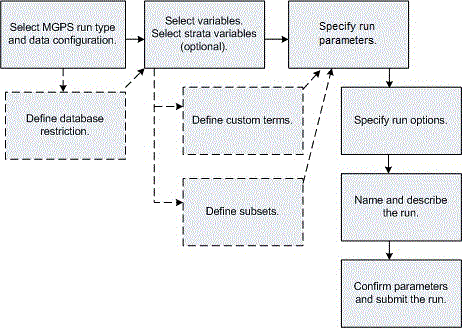About MGPS runs
The main statistical scores computed by an MGPS run are EBGM, EB05, EB95, representing the Empirical Bayes Geometric Mean and the 90% confidence interval from 5% to 95%. The application calculates these scores for each combination of items (such as drugs and events) included in the run. The data configuration that you select determines the items that are available for selection in the run.
Optionally, you can include computations of the following in an MGPS run:
- Information Component (IC)
- Disproportionality estimates and interaction scores using Regression-Adjusted Gamma Poisson Shrinker Algorithm (RGPS)
- Proportional Reporting Ratios (PRR)
- Reporting Odds Ratios (ROR)
When you define an MGPS run, you select the items to combine and for which to generate scores. You typically select a drug (or vaccine) variable and an event (or symptom) variable. You can also select items, such as gender, age group, or report receipt year, for the purposes of subsetting or stratification. You can define a database restriction to limit which cases in source data to include in the run, and custom terms, to select cases meeting specified criteria.
The execution of an MGPS run includes the following steps. Dotted lines represent optional steps.

As a data mining parameter, you can restrict which results from the run to retain. For example, you can keep only results for drug-event combinations that include certain drugs and certain events. Restricting results does not affect the statistical computations. The application performs the statistical computations first and then keeps only results that meet the restriction.
Parent topic: Reference